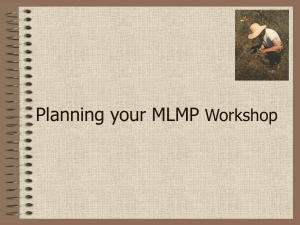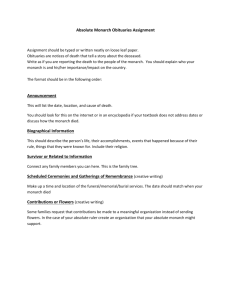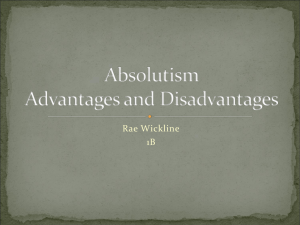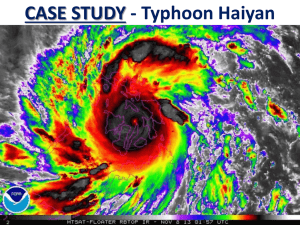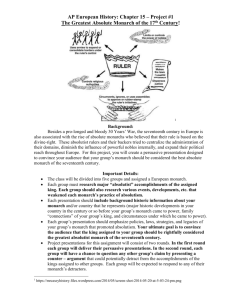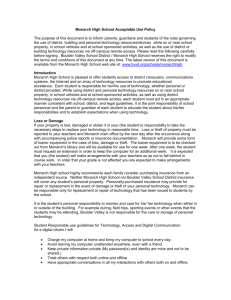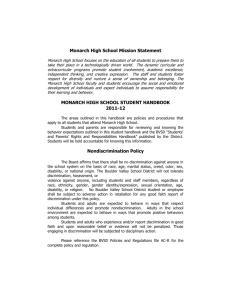Christ the King 24/11/13
advertisement
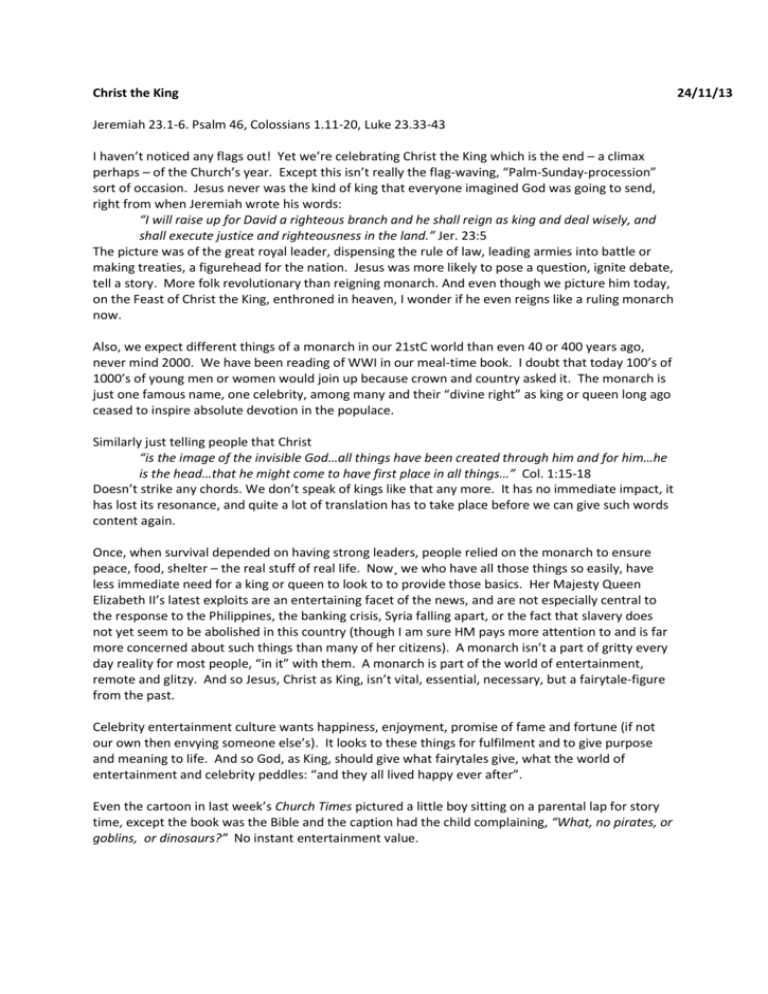
Christ the King Jeremiah 23.1-6. Psalm 46, Colossians 1.11-20, Luke 23.33-43 I haven’t noticed any flags out! Yet we’re celebrating Christ the King which is the end – a climax perhaps – of the Church’s year. Except this isn’t really the flag-waving, “Palm-Sunday-procession” sort of occasion. Jesus never was the kind of king that everyone imagined God was going to send, right from when Jeremiah wrote his words: “I will raise up for David a righteous branch and he shall reign as king and deal wisely, and shall execute justice and righteousness in the land.” Jer. 23:5 The picture was of the great royal leader, dispensing the rule of law, leading armies into battle or making treaties, a figurehead for the nation. Jesus was more likely to pose a question, ignite debate, tell a story. More folk revolutionary than reigning monarch. And even though we picture him today, on the Feast of Christ the King, enthroned in heaven, I wonder if he even reigns like a ruling monarch now. Also, we expect different things of a monarch in our 21stC world than even 40 or 400 years ago, never mind 2000. We have been reading of WWI in our meal-time book. I doubt that today 100’s of 1000’s of young men or women would join up because crown and country asked it. The monarch is just one famous name, one celebrity, among many and their “divine right” as king or queen long ago ceased to inspire absolute devotion in the populace. Similarly just telling people that Christ “is the image of the invisible God…all things have been created through him and for him…he is the head…that he might come to have first place in all things…” Col. 1:15-18 Doesn’t strike any chords. We don’t speak of kings like that any more. It has no immediate impact, it has lost its resonance, and quite a lot of translation has to take place before we can give such words content again. Once, when survival depended on having strong leaders, people relied on the monarch to ensure peace, food, shelter – the real stuff of real life. Now¸ we who have all those things so easily, have less immediate need for a king or queen to look to to provide those basics. Her Majesty Queen Elizabeth II’s latest exploits are an entertaining facet of the news, and are not especially central to the response to the Philippines, the banking crisis, Syria falling apart, or the fact that slavery does not yet seem to be abolished in this country (though I am sure HM pays more attention to and is far more concerned about such things than many of her citizens). A monarch isn’t a part of gritty every day reality for most people, “in it” with them. A monarch is part of the world of entertainment, remote and glitzy. And so Jesus, Christ as King, isn’t vital, essential, necessary, but a fairytale-figure from the past. Celebrity entertainment culture wants happiness, enjoyment, promise of fame and fortune (if not our own then envying someone else’s). It looks to these things for fulfilment and to give purpose and meaning to life. And so God, as King, should give what fairytales give, what the world of entertainment and celebrity peddles: “and they all lived happy ever after”. Even the cartoon in last week’s Church Times pictured a little boy sitting on a parental lap for story time, except the book was the Bible and the caption had the child complaining, “What, no pirates, or goblins, or dinosaurs?” No instant entertainment value. 24/11/13 It is easy nowadays to park God in the bay marked “fiction, fairytale and fantasy” and dismiss him from everyday life. But then when everyday life isn’t “happy ever after”, it is just as easy to blame the God, conveniently ignored otherwise. Abbot Stuart was stopped by two different people as he went to get tickets at Shrub Hill station asking, in so many words, “How can your God allow the typhoon in the Philippines?” And which of us hasn’t asked that question, if not quite so starkly, of our King? A world without typhoons might seem like a blessing. Couldn’t God do it that way? Well, yes, but with a different kind of atmosphere, there might be no life at all on this planet. Or if the nature of gravity were adjusted a fraction so that tides would be less devastating, the delicate balance that keeps everything attached to the planet would fail. Make the laws of nature other than they are and all we cherish and know as good disappears in an instant, along with all that we perceive as bad. What keeps me, you and universe in being, in existence at all, is the restraining arms of God wrapped around every part of this whirling, fractured, and strange-beyond-our-comprehension creation. In him all things hold together Col 1:17 Then the unspoken subtext of the folk at the station is: “I don’t believe in God, but I need someone to blame, so your God did this and you are somehow responsible”. Actually, yes. I am. You see, I am a fatally flawed human being. Had it been up to me to spend £millions installing the very best typhoon prediction equipment in the N. Pacific, I’d probably have gone for second best and saved a lot of multinational negotiation and argument about who should pay. Had it been up to me to spend £100,000’s building typhoon-proof villages, or establishing emergency evacuations procedures just in case a typhoon should strike “just there”, I’d probably have waited and hoped for the best too. Had it been up to me to question why people were living in abject poverty and couldn’t afford to build decent homes away from the danger zone, to campaign vigorously for a better deal fro the world’s poor, I know I actually didn’t bother – and still don’t. There were hecklers at the cross too: “He saved others, let him save himself if he is the Messiah of God, the chosen one!” “If you are the King of the Jews, save yourself.” Luke 23: 35, 37 “We want the dream. So give it. Now. Do it. Prove it.” But Jesus doesn’t. And this IS the God I believe in. This is my King. The one who refuses to conform to my expectations and demands. Who is not superficial, not glitzy, celebrity, make-it-better, happy ever after, quick fix. Not ordering the lives of his subjects for them to bring peace and stability and universal happiness. But here, on a cross, absorbing the strife and mess. What nails him there is our making God what we want him to be and then hating him when he isn’t that. What nails him there is our thinking we know better. What nails him there is our refusal to take the responsibility that is ours – to live life truly well and fully, and to care for even the stranger. What keeps him there is his infinite love and desire for us to discover we can be different. To adapt a quotation from another of our mealtime books: Unconditional love is arduous to give, and even more arduous to receive. It can prompt…a cruelty on the part of the recipient. Such love, in its willingness to forgive all…can come to seem [to the recipient, mistakenly] like a declaration of insufficiency on the part of the recipient:. “ You cannot match my love; your love will always fall short of mine”. Added to this is the realization that the lover who loves you so much cannot be hurt by you; that their love is imperishable. Therefore you can try, almost guiltlessly, to hurt them. It becomes a challenge.” Robert Macfarlane, The Old Ways: A Journey on Foot p.336 This is the God I have come to believe in, whose unconditional love I am trying to learn to receive: in letting God be God, in sitting in silence with this God, in listening, often hearing nothing but trusting anyway. There then becomes a room for not understanding, or needing to pretend to. There is openness to not knowing everything – to un-knowing, because, however distantly, there is a sense also of being mysteriously, totally, beloved. Perhaps as Advent opens up before us we can make a little more space to absorb, to accept, who God really is as we prepare to welcome him to the manger.
